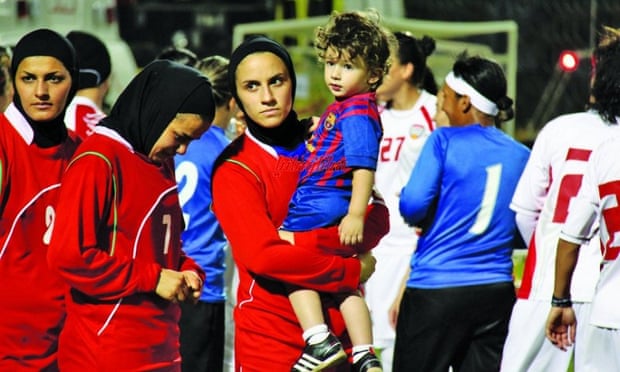The captain of an Iranian women’s football team is to miss a forthcoming Asian championships because her husband would not allow her to renew her passport.
In a case highlighting Iran’s discriminatory law that requires married women to have permission from their husband before travelling abroad, Niloufar Ardalan, 30, will not be able to join teammates for the AFC Women’s Futsal Championship, an important showcase event in her 19-year career as a footballer.
“This is the first time such Asian championships are held and I had participated in all training camps by the national team,” Ardalan told Iran’s Nasim Online news agency. “But I will miss the tournament because my husband is opposed to me travelling abroad.”
The inaugural tournament, to be held in Malaysia next week, brings together Asia’s best female players of futsal, a variant of five-a-side football. But Ardalan, lauded as the best female player in
Iran, will miss out.
“This tournament was very important for me and as a Muslim woman I wanted to hold my country’s flag high, I wasn’t going there to have fun,” she said. “I just wanted to fight for my national flag. The national team needs me but I’m not able to join them.”
Her ordeal has resonated with many of her countrymen and women, with thousands expressing solidarity with her online.
Maryam Tousi, Iran’s record-holder female sprint athlete
wrote on her Instagram account that she was extremely saddened to hear about Ardalan’s plight. Ebrahim Asgharzadeh, a former reformist MP and famous revolutionary in 1979, said
on Instagram: “What is her crime? Why can’t she accompany her team for Asian Cup and travel abroad?”
The ability of Iranian women to travel abroad is dictated by their age and marital status. Single women below the age of 18 would need permission from their custodian, usually their father, in order to be able to apply for a passport and leave Iran, but single women above that age are free to travel abroad.
Married women, however, need permission to travel abroad unless their marriage contract makes clear that the husband has already relinquished such power. Many young Iranian women now only accept marriage proposals on this condition. The only exception is for women who want to make the hajj pilgrimage in Mecca, for which they can be issued a one-time travel document even without their husband’s approval.
Iranian cartoonists have reacted to Ardalan’s case. Shahrokh Heydari
depicted her playing in the field with one of her legs chained. Another cartoon by Mana Neyestani shows her playing in a football match with
her husband on the sidelines calling her to return home.
Ardalan, a physical education graduate,
was interviewed by the Guardian in 2005 in Tehran after she and teammates in Iran’s women’s indoor league persuaded the country’s football federation to let them attend a match at Tehran’s majestic Azadi stadium for the first time.
Her husband has been named by Iranian media as Mehdi Totounchi, a journalist and a presenter on Iran’s state TV. He reportedly wants her to be home for the start of the school year next week.
Although discriminatory laws are persistent in Iran, the country’s female population is very active.
Until recently most university graduates were women and many, especially in bigger cities, work alongside men. Woman have held senior jobs, including ministerial roles, in Iran. It emerged in April that Hassan Rouhani’s administration
had appointed Iran’s first female ambassador since the 1979 Islamic revolution.
Women can also vote and drive but are required to wear the hijab and, in courts, their testimony is worth only half that of a man. The age of criminal responsibility for girls is nine years old compared with 15 for a boy. They also face inequality with regard to inheritance rights.
On Wednesday, a Tehran court was reported to have fined two women $260 for wearing headscarves deemed un-Islamic.volution.
